
Over the last couple of weeks, I have been travelling a fair bit, promoting the Institute of Export & International Trade (IOE&IT), highlighting the important role of building trade links and ensuring the emerging landscape for international trade is a healthy and compliant environment.
Dubai Freeport conference
My most recent trip was to Dubai, to participate in the World Freezone Annual Conference. Which was addressed by IOE&IT’s very own Kevin Shakespeare, director of special projects and international trade. Kevin highlighted two essential elements of international trade.
First, he pointed to the professionalisation of trade and how those involved in international trade need to understand the rules and regulations and how they apply, but also need to ensure the businesses involved in international trade don’t experience
delays or put themselves at risk.
Second, he looked at the digitalization of international trade and what it is going to mean for businesses. With the electronic trade documents bill (ETDB) going through the Houses of Parliament, the UK has the potential to be at the heart of this transformation.
The Institute is playing a central role in advising, supporting and developing this new global digital trade environment, but is also providing policy and regulatory advice.
We’re central to interpreting that policy to make sure the businesses and professionals taking part in trade know what they have to do and what their responsibilities are.
There's a real understanding that international trade is changing and is going to continue to change, driven partly by the supply chain meltdown caused by COVID and by technological advancements.
This is an issue that really matters to governments, regulators and businesses and the Institute has a role as the key interlocutor able to interpret what these changes mean, and how to adapt business models or how to adapt regulatory environments to
ensure they are benefiting from this new emerging landscape.
In Dubai I met with investors, businesses and the UK Consul General. We discussed with the Consul General how the Institute can collaborate with the government and the authorities in Dubai across the wider United Arab Emirates (UAE).
We discussed using digital trade corridors and how that platform can be used to speed and link trade between the UAE and the UK and build a resilient supply chain for the UK. But we also discussed how the Institute’s qualifications and training can be
deployed to support businesses in the UAE and help inform and educate UAE trade advisors.
There's lots of potentially great opportunities. The Consul General also hosted a reception for the Institute with our partners at Liverpool Freeport and UK government departments, including the Department of Housing, Levelling Up and Communities and
the Department for Business and Trade. The reception at the embassy was attended by key businesses in Dubai and UK businesses operating out of the UAE.
Uzbekistan
Before Dubai, I took part in the Tashkent International Investment Forum. This was a truly global event, bringing together traders, organisations, government departments and investors from around the world.
During the conference I had meetings with the Investment and Foreign Trade Ministry, the agency for export promotion, with deputy ministers from the Agriculture Department, Water Resources, Foreign Affairs and Digitalization.
I was also interviewed on national television and we met with the University of World Economy and Diplomacy, Westminster University, which has a great campus in Tashkent, and also the Tashkent University for Entrepreneurship and Management. I also had
pleasure of meeting the UK ambassador in Tashkent.
My key takeaways from this first visit to Uzbekistan is that it's a hugely dynamic nation. Some 750 years ago it was the heart of the Silk Road and was the link between China and Europe. It saw the great diplomat and trader Marco Polo using the silk road
through Tashkent and Samarkand for the transportation of goods.
Today, the government made it very clear - from the President’s opening statement at the event and in conversations with ministers, deputy ministers and business people - that they all see Uzbekistan today as having the opportunity to again be a link
between East and West.
As a double landlocked country, it has some distinctive challenges. But they are keen to explore ways in which both the digitalization of trade and the opening of new trade routes can position Uzbekistan not just to trade in its own goods, but for it to be a regional hub for trade once again, linking with the West.
We had hugely positive conversations around the conference, and it’s clear they see the Institute and our members as being key partners and collaborators in achieving that ambition to be a regional centre of excellence and a global hub.
I will be connecting with members and the IOE&IT's wider community to see what we can do to help and support the digitalization of trade, to build skills, knowledge and expertise in Uzbekistan. We’ll see what insight and support we can give with regards to the regulatory reform and policy development, which is going to be essential for Uzbekistan. It was incredible few days of very positive conversations.
My only other observation is that whatever I imagined Tashkent to be, it far surpassed my expectations. It is a cosmopolitan, international city, clean and well run. And a dynamic energy exists among its brilliant population.
My biggest takeaway from both these visits is not only that the Institute has a key role to play, but also that the issues of export and international trade are crucial. Our members are seen as being at the leading edge, being the driving force for the developments taking place. We have a key role to play in ensuring that trade in the future is compliant, healthy and that as many businesses as possible are able to exploit the great opportunities that come from trading internationally.



